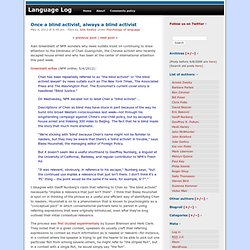

“Unable to understand some basic sentences”? « previous post | next post » According to a recent press release, "Many English speakers cannot understand basic grammar": Research into grammar by academics at Northumbria University suggests that a significant proportion of native English speakers are unable to understand some basic sentences.
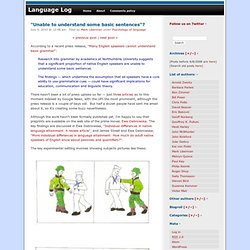
The findings — which undermine the assumption that all speakers have a core ability to use grammatical cues — could have significant implications for education, communication and linguistic theory. Map–territory relation. "The map is not the territory"[edit] The expression "the map is not the territory" first appeared in print in a paper that Alfred Korzybski gave at a meeting of the American Association for the Advancement of Science in New Orleans, Louisiana in 1931:[1] In Science and Sanity, Korzybski acknowledges his debt to mathematician Eric Temple Bell, whose epigram "the map is not the thing mapped" was published in Numerology.[2]
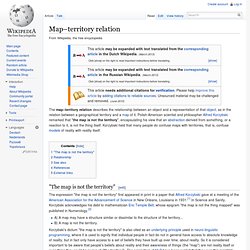
Borges.
‘No word for X’ archive. No words, or too many. « previous post | next post »
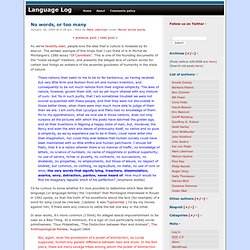
No Arabic word for bluff? « previous post | next post » Those familiar with our history of "No word for X" posts will appreciate Haider Ala Hamoudi's essay "The Dangers of Pop Linguistics: Arab Bluffs and Arab Compromise", posted at Islamic Law in Our Times, 3/6/2012.
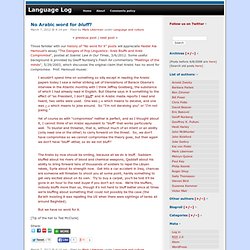
Some useful background is provided by Geoff Nunberg's Fresh Air commentary "Meetings of the minds", 5/29/2003, which discusses the original claim that Arabic has no word for compromise. Prof. Pullum-Eskimo-VocabHoax. Setting the Record Straight: Are Native American Languages Primitive? AAS Abstracts: Interarea, Library, & Teaching. Organizer: Catherine S.
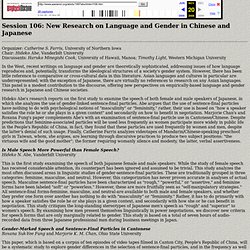
Farris, University of Northern Iowa Chair: Hideko Abe, Vanderbilt University Discussants: Haruko Minegishi Cook, University of Hawaii, Manoa; Timothy Light, Western Michigan University In the West, recent writings on language and gender are theoretically sophisticated, addressing issues of how language reproduces and, potentially, transforms the ideological structures of a society's gender system. However, there has been little reference to comparative or cross-cultural data in this literature.
Asian languages and cultures in particular are underrepresented; with the exception of Japanese, there are virtually no references to research on any Asian languages. This panel is a modest contribution to the discourse, offering new perspectives on empirically-based language and gender research in Japanese and Chinese societies. Is Male Speech More Powerful than Female Speech? This is the first study examining the speech of both Japanese female and male speakers. Electronic Antiquity v1n6 - The Voice of Cicadas: Linguistic Uniqueness, Tsunoda Tananobu's Theory of the Japanese Brain, and Some Classical Perspectives.
For an Isolated Tribe, Time Follows the Terrain, and the Future is Uphill. When we say “I knew him way back when,” or “the best years are still ahead of you,” we’re using space to set up a timeline, with the past trailing behind us and the future stretching forward.

Scientists long assumed that all people envisioned time that same way. But more recent studies have shown that’s not the case: Mandarin Chinese speakers may refer to the past as above them and the future as below. When the Pormpuraawans, a tribe in the Australian outback, think of time’s physical progress, they leave their own location out of it: time flows from east to west, regardless of which way they themselves are facing.
Backs To The Future: Aymara Language And Gesture Point To Mirror-Image View Of Time. Tell an old Aymara speaker to "face the past!

" Reference desk/Archives/Language/2009 November 11. Prison learning[edit] Imagine this Kafkaesque scenario: A man is locked in a prison cell for a very long time, let's say a life sentence.
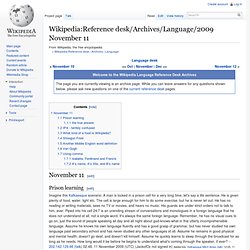
He is given plenty of food, water, light etc. The cell is large enough for him to do some exercise, but he is never let out. He has no reading or writing materials, sees no TV or movies, and hears no music. Conservapedia:Linguistic determinism. Linguistic determinism is a quasi-theory pulled from his ass suggested by Andrew Schlafly which tries to explain the development of history by reference to fully unidentified much less articulated properties of ancient and modern languages.
Students of his World History Course have been fortunate enough to be first to receive an education on this pioneering new theory, and from the very genius who created it. [edit] The central claims of the theory 1. Certain languages have much more expressive power than others. Latin for example, could in a few words express something that takes a whole sentence to state in English...or if translating literally to English, a few words:
Person-first language. Person-first language is the latest in the lineup of politically correct ways to patronize the disabled a wonderful way to ensure inclusion, freedom, and respect for persons with handicapableness.

[edit] How it works. Once a blind activist, always a blind activist. « previous post | next post » Alan Greenblatt of NPR wonders why news outlets insist on continuing to draw attention to the blindness of Chen Guangchen, the Chinese activist who recently escaped house arrest and who has been at the center of international attention this past week.
